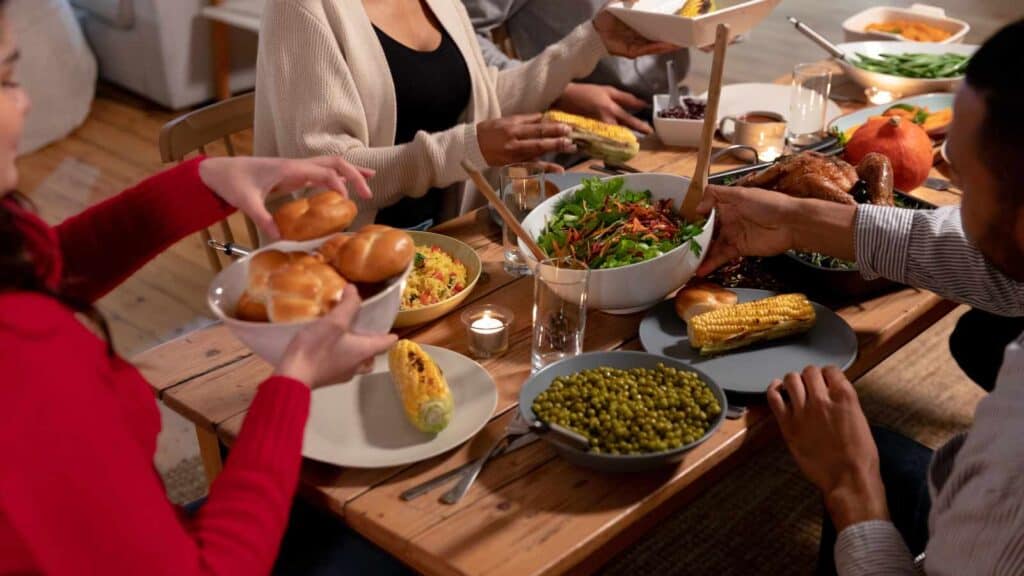15 middle-class habits the upper class secretly admires
Luxury cars and private jets might turn heads, but it’s the simple middle-class routines that quietly win the upper class’s respect.
It’s easy to assume the grass is always greener on the other side of the income bracket, but what if that’s not the whole story? We often see portrayals of wealth that focus on extravagance. Still, behind the scenes, there’s a surprising level of admiration for the grounded habits of the middle class.
A study from the National Institutes of Health (NIH) found that stronger social relationships, often nurtured in close-knit communities, are directly linked to a longer, healthier life. This powerful connection is something that can’t be bought, and it’s a cornerstone of middle-class life that many with more resources find appealing.
These habits aren’t about financial status; they’re about a different kind of richness built on practicality, community, and resourcefulness. They foster resilience and a sense of genuine connection that money often complicates rather than creates.
From the simple joy of a home-cooked meal to the satisfaction of a DIY project well done, these practices offer a level of fulfillment that transcends monetary wealth. They represent a balanced approach to life that prioritizes well-being and personal satisfaction over material accumulation, a perspective that is gaining quiet respect across all social strata.
The Art of the Home-Cooked Meal

Sharing a meal prepared at home is a classic middle-class tradition. It’s about more than just saving money on takeout; it’s an opportunity for connection and a way to control what goes into your body. Families gather, share stories about their day, and build bonds over the dinner table. This simple act of cooking and eating together fosters a sense of stability and togetherness that is often missing in a world of catered events and restaurant reservations.
This daily ritual has significant health benefits. The Johns Hopkins University highlights that people who frequently cook meals at home consume fewer carbohydrates, less sugar, and less fat than those who cook less or not at all. It’s a hands-on approach to wellness that instills a fundamental understanding of nutrition and portion control, creating healthy habits that last a lifetime.
Pro Tip: A National Institutes of Health(NIH) study suggests that eating a home-cooked meal five to seven times a week lowers the risk of developing type 2 diabetes by 15% compared to those who eat home-cooked meals only twice a week or less.
Pride in DIY Projects
Tackling a home improvement project yourself is a hallmark of middle-class resourcefulness. It’s about more than just the financial savings of not hiring a professional; it’s about the immense pride that comes from learning a new skill and seeing the tangible results of your hard work. Be it painting a room, building a bookshelf, or fixing a leaky faucet, the DIY mindset cultivates self-reliance and problem-solving skills.
This hands-on approach provides a powerful sense of accomplishment and personal investment in one’s home. This ability to create, repair, and improve one’s own environment is a profoundly satisfying skill that builds confidence and competence.
Unique Research Insight: Engaging in creative, hands-on activities, such as DIY projects, can help reduce stress and improve mental well-being. A study published on PubMed Central noted that such activities can create a state of “flow,” which is associated with increased happiness and reduced anxiety.
Fostering Strong Neighborhood Bonds
In many middle-class communities, neighbors aren’t just people who live next door; they’re an extended support system. From borrowing a cup of sugar to keeping an eye on each other’s homes during vacation, these relationships create a powerful sense of security and belonging. This community-centric lifestyle fosters trust and mutual support, turning a street into a real neighborhood.
The benefits of these social ties are profound. Research supported by the National Institutes of Health (NIH) has consistently shown that individuals with strong social connections experience lower rates of depression and anxiety. This web of informal support provides a safety net that can be more valuable than any formal service.
Tip: Simple acts, such as organizing a neighborhood block party or starting a community garden, can significantly strengthen local bonds and improve the collective well-being of everyone involved.
The Discipline of Budgeting
Managing a household budget is a fundamental skill for middle-class families. It’s not about restriction, but about empowerment—making conscious decisions about where money goes to achieve long-term goals, such as buying a home, saving for college, or planning for retirement. This careful planning and financial discipline require foresight and a practical approach to personal finance.
This habit fosters a deep understanding of the value of money and the importance of living within one’s means. The Consumer Financial Protection Bureau emphasizes that tracking income and expenses is the first step toward financial security. This mindful approach to spending avoids the stress of debt. It creates a stable foundation for the future, a practice secretly admired by those who may have more but spend it less wisely.
Pro Tip: Automating small savings into a separate account each payday is a simple budgeting trick that ensures consistent progress toward financial goals without requiring constant willpower.
Valuing Public Education
For many middle-class families, the local public school is the heart of the community. There’s a deep-seated belief in the power of public education to provide opportunities for all children. Parents often get actively involved, volunteering for the PTA, attending school board meetings, and supporting teachers. This collective investment helps create a better learning environment for everyone.
This involvement stems from a genuine commitment to the community’s future. The National Center for Education Statistics shows a strong correlation between parental involvement and student achievement. This dedication to public institutions reflects a belief in civic duty and the common good. This principle benefits society as a whole.
Tip: Even if you don’t have children in school, attending local school sporting events or theater productions is a great way to support students and connect with your community.
The Joy of a Well-Tended Garden

Spending a weekend afternoon tending to a garden is a cherished pastime among middle-class individuals. It’s a way to connect with nature, get some physical activity, and beautify one’s personal space. The satisfaction of watching something grow from a tiny seed into a blooming flower or a ripe vegetable is a simple, profound pleasure.
Gardening offers more than just aesthetic appeal. The United States Department of Agriculture (USDA) notes that home gardening can enhance access to fresh, healthy produce. Furthermore, the physical act of gardening is a form of moderate exercise, and studies cited by the National Institutes of Health (NIH) have shown that exposure to soil microbes can even have an antidepressant effect.
Strategic and Savvy Shopping
Middle-class shoppers are masters of finding a good deal. This goes beyond just clipping coupons; it involves comparing prices, waiting for sales, and knowing the actual value of an item. It’s a strategic approach to consumption that prioritizes quality and longevity over impulse buys and brand names. This savviness ensures that every dollar is spent wisely.
This habit of mindful consumption has a positive ripple effect. It reduces waste and discourages a culture of disposability. The Federal Trade Commission (FTC) often provides resources to help consumers become smarter shoppers and avoid scams, emphasizing the importance of being an informed and cautious consumer. This practicality is a skill that ensures financial stability and resourcefulness.
Pro Tip: Many savvy shoppers use a “30-day rule.” If you want to make a non-essential purchase, wait 30 days. If you still want it after a month, then consider buying it. This helps separate fleeting wants from genuine needs.
Prioritizing Family Vacations

For many middle-class families, the annual family vacation is a sacred tradition. It might not be a luxurious trip to an exotic locale, but rather a road trip to a national park, a week at the beach, or a visit to relatives in another state. The focus isn’t on opulence but on creating shared memories and spending quality time together, away from the routines of daily life.
These experiences are incredibly valuable for family bonding and personal growth. Taking time off for vacation can improve individual well-being and strengthen family relationships. These shared adventures become cherished stories that are told and retold for years, reinforcing family identity and connection.
Tip: Planning vacations around national parks or historical sites can be both affordable and educational, offering a rich experience for the whole family. The National Park Service website provides extensive resources for planning such trips.
A Strong Work Ethic
A strong work ethic is deeply ingrained in middle-class culture. It’s the belief that hard work, dedication, and reliability are the keys to success and personal fulfillment. This isn’t about working endless hours, but about taking pride in your work, showing up on time, and giving your best effort, regardless of the task at hand.
This commitment to doing a job well is a source of self-respect and provides a sense of purpose. It’s a value that is often passed down through generations. This dedication is usually admired by those in upper-class positions who rely on a dependable and motivated workforce to run their businesses and manage their affairs.
Unique Research Insight: A study published on PubMed Central found that a sense of purpose and pride in one’s work is linked to greater psychological well-being and even longevity, independent of income level.
The Practicality of Driving Sensible Cars
While luxury cars can serve as a status symbol, many middle-class individuals opt for practical, reliable, and fuel-efficient vehicles. The decision is based on logic rather than emotion, prioritizing safety ratings, maintenance costs, and longevity over speed and flash. A car is seen as a means of transportation to get from point A to point B safely and affordably.
This practical mindset extends to car maintenance, with many owners learning basic upkeep to save money and prolong their vehicle’s life. This approach reflects a broader philosophy of pragmatism and long-term thinking. This financial prudence is a cornerstone of building wealth, regardless of one’s starting point.
Pro Tip: Following the manufacturer’s maintenance schedule, available through resources such as the National Highway Traffic Safety Administration (NHTSA), is the most effective way to ensure a vehicle’s safety and reliability over its lifespan.
Cherishing Hand-Me-Downs
In middle-class families, hand-me-downs are a regular and celebrated part of life. From baby clothes and toys passed between siblings to a grandparent’s cherished piece of furniture, these items carry sentimental value that new products can’t replicate. This practice is both economical and sustainable, reducing waste and preserving family history.
This tradition fosters an appreciation for durability and heritage. It teaches children that not everything needs to be new to be valuable. The U.S. Environmental Protection Agency (EPA) promotes reuse and repair as key strategies for waste reduction. This principle has been intuitively practiced by middle-class families for generations.
Tip: When passing down furniture or other durable goods, include a small written note about its history or a fond memory associated with it. This enhances its sentimental value for future generations.
Active Community Involvement
Beyond just knowing their neighbors, many middle-class individuals are actively involved in their local communities. This can mean volunteering for a local charity, coaching a youth sports team, or participating in civic organizations. It’s a commitment to giving back and making their community a better place for everyone.
This level of civic engagement strengthens the social fabric and creates resilient, supportive communities. The National Institutes of Health(NIH) has published extensive research showing that volunteering provides health benefits to those who serve and improves community outcomes. This dedication to the collective good is a powerful force for positive change.
Teaching Children the Value of Chores
In many middle-class households, children are expected to contribute by doing regular chores. This isn’t just about getting help with housework; it’s a fundamental way of teaching responsibility, discipline, and the importance of being part of a team. Completing chores helps children develop a strong work ethic and a sense of competence from a young age.
This practice has long-term benefits for a child’s development. Studies have suggested that children who do chores are more likely to become well-adjusted adults who are better able to deal with frustration and delay gratification. It instills the life skill of contributing to a household, which is essential for future independence.
Loyalty to Local Businesses
While big-box stores offer convenience, a strong middle-class tradition supports local, family-owned businesses. Be it the neighborhood hardware store, the local diner, or the corner bakery, there’s an understanding that these businesses are the backbone of the community. This loyalty helps keep local economies vibrant and maintains the unique character of a town.
Choosing to shop local is a conscious decision to invest in one’s own community. The U.S. Small Business Administration (SBA) reports that small businesses create the majority of new jobs and drive innovation. By supporting them, middle-class consumers directly contribute to the financial health and stability of their own neighborhoods.
Tip: Many communities have “shop local” initiatives or loyalty programs. Participating in these can provide discounts while also making it easier to discover and support local entrepreneurs.
The Ability to Entertain Simply
Entertaining in a middle-class home is often about genuine hospitality rather than elaborate displays. It’s a backyard barbecue with burgers on the grill, a potluck where everyone brings a dish, or a game night with friends. The focus is on creating a warm, welcoming atmosphere where people can relax and enjoy each other’s company.
This casual approach to hosting removes the pressure and pretense that can come with formal entertaining. It emphasizes human connection over performance. The simple act of opening one’s home to friends and family, without the need for perfection, fosters deep and authentic relationships—a form of wealth that everyone can appreciate.
Unique Research Insight: A study cited by the National Institutes of Health (NIH) on social connections found that informal social gatherings, such as a casual get-together at home, are highly effective in reducing feelings of loneliness and strengthening social bonds.
Why investing for retirement is so important for women (and how to do it)

Why investing for retirement is so important for women (and how to do it)
Retirement planning can be challenging, especially for women who face unique obstacles such as the wage gap, caregiving responsibilities, and a longer life expectancy. It’s essential for women to educate themselves on financial literacy and overcome the investing gap to achieve a comfortable and secure retirement. So, let’s talk about why investing for retirement is important for women and how to start on this journey towards financial freedom.







